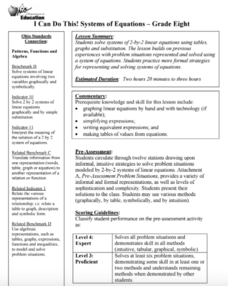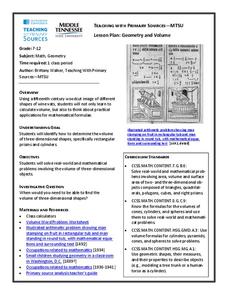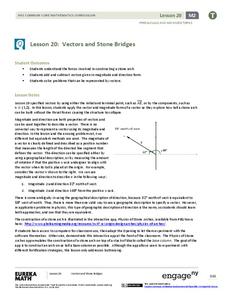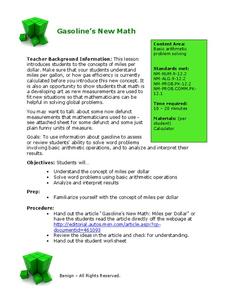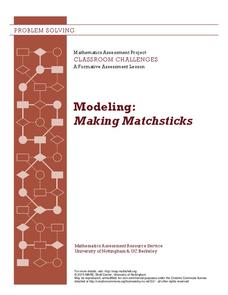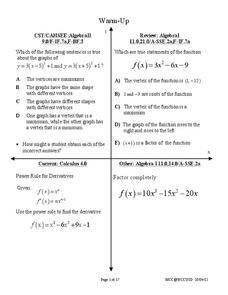Curated OER
Yummy Gummy Subtraction
Here is a quick 15 minute lesson intended to introduce subtraction. Learners count and subtract gummy bears to complete 5 problems. The lessons suggest that the gummy bears can be saved and used the next day, but gummy bears get gross...
Arizona Department of Education
Area and Perimeter of Regular and Irregular Polygons
Extend young mathematicians' understanding of area with a geometry lesson on trapezoids. Building on their prior knowledge of rectangles and triangles, students learn how to calculate the area of trapezoids and other irregular...
Mathematics Assessment Project
Solving Quadratic Equations
Scholars first complete an individual assignment using a quadratic equation to model the movement of a bus around a corner. Learners then discuss their solutions with classmates and analyze the provided sample responses.
EngageNY
Creating Division Stories
Create your own adventure story ... well, not really. The fifth lesson in a 21-part series has pairs create story contexts for division problems. The lesson presents a step-by-step process for pupils to follow in writing such stories.
Ohio Department of Education
I Can Do This! Systems of Equations
Use tables, graphs, and substitution to solve systems of linear equations. An envelope of sample problems is passed around the classroom, and each learner has the opportunity to solve the system in the envelope. This is a great way to...
Arizona Department of Education
Introduction to Integers
Welcome to the backward world of negative numbers. This introductory lesson teaches young mathematicians that negative numbers are simply the opposite of positive numbers as they use number lines to plot and compare single-digit integers.
Virginia Department of Education
Geometry and Volume
The history of math is fascinating! Utilize a woodcut primary source image from 1492 and posters from the 1930s to help geometers apply their volume-calculation skills to real-life questions.
Curated OER
Using Algebra Tiles to Explore Distributive Property
Math is fun with algebra tiles! Young mathematicians explore eight expressions involving the distributive property and use algebra tiles to expand simple expressions. The resource is perfect for both guided and independent practice.
EngageNY
Tides, Sound Waves, and Stock Markets
Help pupils see the world through the eyes of a mathematician. As they examine tide patterns, sound waves, and stock market patterns using trigonometric functions, learners create scatter plots and write best-fit functions.
Bowland
Alien Invasion
Win the war of the worlds! Scholars solve a variety of problems related to an alien invasion. They determine where spaceships have landed on a coordinate map, devise a plan to avoid the aliens, observe the aliens, and break a code to...
EngageNY
Vectors and Stone Bridges
What does it take to build a stable arch? Pupils apply vectors and physics as they examine arched bridges and their structural integrity. They use vectors to represent the forces acting on the stone sections and make conclusions based on...
Beyond Benign
Got Gas
How much gas does it take to drive around town? The class uses a variety of mathematical procedures to take a look at the use of gas for transportation. Class members use a different unit to determine the cost of driving a car as opposed...
Mathematics Assessment Project
Modeling: Making Matchsticks
Math: The only subject where the solution to a problem is seven million matches. Young scholars first complete an assessment task estimating the number of matches they can make from a tree of given dimensions. They then evaluate provided...
Curated OER
Fantastic Fractions
Young math whizzes solve 20 various types of equations related to fractions. First, they state each portion shaded as a fraction in lowest terms. Then, they determine the missing numerator or denominator and determine the value of each...
Mathematics Vision Project
Module 1: Getting Ready Module
This fabulous resource is a must-have for any algebra teacher's arsenal of lessons. Developing the idea of equations and use of variables from basic physical scenarios, learners gain valuable intuition in the structure and meaning of...
Sprite Box
Lightbot Jr 4 Coding Puzzles
Learning how to write computer code has never been so much fun! Given control of their very own robots, children create simple programs in order to solve a series of challenges and develop their problem solving skills.
Curriculum Corner
Guest Teacher Plans: Grade 6
Taking a day off of school can feel like a lot more work than going because of the time and effort that goes into making sub plans. Make your life easier with a daily plan for a guest teacher designed to meet the needs of sixth graders...
NASA
Lights on the International Space Station
Groups explore illumination with NASA's Lighting Environment Test Facility (LETF) as a context. Using the TI-Nspire app, groups determine the lux equation that models their simulation. They then use the lux equation to solve problems...
Mathematics Assessment Project
Sorting Equations and Identities
Identify the identity. Learners first solve equations to find the number of solutions. Scholars then determine if given equations are always, sometimes, or never true, leading to the concept of identities.
Curated OER
Introduction to Exponents
Problem solve using exponents. Pupils read One Grain of Rice: A Mathematical Folktale and write powers to represent amounts from the story.They compare actual solutions to their predictions and play a game to practice using exponents.
Mathematics Assessment Project
Matching Situations, Graphs and Linear Equations
What do guitars, candles, and helicopters have in common? They're all in this resource. Learners complete an assessment task to determine the amount of profit made in a guitar class based on given information regarding variable...
Curated OER
Lesson 2 Solving y=mx+b systems
Students solve linear systems using slope intercept form. In this algebra instructional activity, students solve equations by rewriting them in the form y = mx + b. They evaluate coordinate pairs to see if they are a solution to the...
Curated OER
Modeling: Having Kittens
Cats can't add, but they do multiply! Determine the number of descendants of a single cat given specific facts about cats and kittens. The lesson focuses on developing strategies for problem solving using both individual and group work....
West Contra Costa Unified School District
Particle Motion
Derivatives are useful for many things — they can even keep track of particle motion. An informative lesson plan provides an introduction to the idea of the second derivative in particle motion. Class members determine the velocity...






